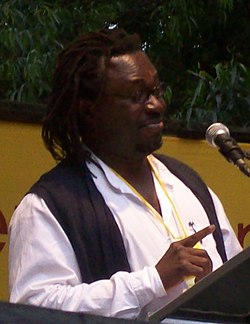Obi Nwakanma | |
|---|---|
 An image of Obi Nwakanma | |
| Born | 18 December 1966 |
| Occupation | Lecturer, poet |
| Language | Igbo, English |
| Nationality | Nigerian |
| Citizenship | Nigerian/American |
| Education | Government College, Umuahia; University of Jos; Washington University in St. Louis; Saint Louis University, Missouri |
| Notable works | Birthcry |
Obi Nwakanma is a Nigerian poet, literary critic, journalist and academic at University of Central Florida. He writes a regular Sunday column on Vanguard Newspaper called The Orbit. His works have also appeared in The Punch , ThisDay and TheCable . [1] [2] [3] [4] [5]